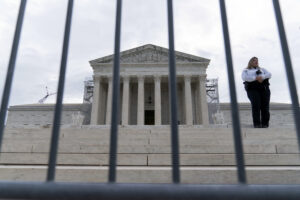Affirmative Dissatisfaction
I believe in affirmative action, but I have to acknowledge that there are arguments against it. One of the more cogent is the presence of Justice Clarence Thomas on the U.S. Supreme Court.WASHINGTON — I believe in affirmative action, but I have to acknowledge that there are arguments against it. One of the more cogent is the presence of Justice Clarence Thomas on the U.S. Supreme Court.
If you caught Thomas on “60 Minutes” Sunday night, you know that he will probably consider me one of the many people who want to see him “destroyed” because he doesn’t “follow in this cult-like way something that blacks are supposed to believe.” That’s what he told CBS correspondent Steve Kroft — that he’d been persecuted for “veering away from the black gospel that we’re supposed to adhere to.”
The up-close-and-personal “60 Minutes” piece, timed to coincide with publication of Thomas’ autobiography, was compelling television. It was also a useful reminder that whenever my Bush Derangement Syndrome flares up to the point where I’m actually feeling nostalgic for the days when George Bush the Elder was in the White House, I need only recall that it was Poppy who put Thomas on the court. That snaps me back to my senses. Thomas is only 59; we’ll be saddled with him, and that gigantic chip on his shoulder, for decades to come.
Thomas said in the interview that the scorched-earth battle over his confirmation wasn’t really about him, it was about abortion. Yet at other points he made clear that the whole thing was about him, specifically his commission of the ultimate sin: He is a (drum roll, please) black conservative. Cover the children’s ears.
“I’m black,” he told Kroft. “So I’m supposed to think a certain way. I’m supposed to have certain opinions. I don’t do that. You don’t create a box and put people in and then make a lot of generalizations about them.”
Enough with the violins. When Fox News bloviator Bill O’Reilly says that African-Americans are “finally” beginning to “think for themselves,” I chalk it up to the fact that his germane experience with black people is probably limited to that recent dinner he had with the Rev. Al Sharpton and a room full of shockingly well-behaved patrons at Sylvia’s, the Harlem soul-food shrine. But Thomas should know better. Either he’s being disingenuous or he has a persecution complex of Norse-saga proportions.
There are, as he ought to know, plenty of black conservatives. There are plenty of African-American parents teaching their children the same lessons of hard work and self-reliance that Thomas’ grandfather taught him. The black church, I would argue, is one of the more socially conservative major institutions in the nation.
Black America has never been monolithic in its views, but black Americans do vote almost monolithically for Democrats. That wouldn’t necessarily be the case if Richard Nixon hadn’t built an electoral strategy on a race-based appeal to Southern whites — and if every Republican presidential candidate and party leader since Nixon hadn’t followed suit. Just last week, the four leading contenders for the Republican nomination all skipped a forum at historically black Morgan State University. As long as snubbing black voters is seen as smart politics in the Republican Party, black conservatives have good reason to stick with the Democrats.
Back to affirmative action, which Thomas famously opposes: He was 43 and had one year of judicial experience when Bush the Elder nominated him to replace Thurgood Marshall on the court. Even Thomas can’t seriously believe Bush’s claim that he was the “most qualified” candidate.
In the interview with Kroft, Thomas spoke of his experience at Yale Law School, which set aside a number of slots for minority students. He said he sees his Yale law degree as “tainted,” worth less than a white student’s degree.
This is why some critics have described Thomas as self-loathing — not because he holds conservative political views or because he’s a Republican, not because he objects in principle to affirmative action, but because he so discounts his own achievement. All Yale gave Thomas was the opportunity; he had to earn the degree. Yet he overlooks his own brains and hard work.
Thomas resents the fact that he couldn’t get a job despite graduating in the middle of his class. Maybe prospective employers thought his white classmates were smarter, or maybe they just didn’t want to hire a black man. But even if the whole world undervalued Clarence Thomas, why does he so undervalue himself that he keeps his law diploma in the basement with a “15 cents” sticker on the frame?
Thomas really should work these issues out for himself. Instead, he seems to be doing his best to save future generations of disadvantaged minorities from the indignity and shame of a Yale law degree.
Eugene Robinson’s e-mail address is eugenerobinson(at)washpost.com.
© 2007, Washington Post Writers Group
Your support matters…Independent journalism is under threat and overshadowed by heavily funded mainstream media.
You can help level the playing field. Become a member.
Your tax-deductible contribution keeps us digging beneath the headlines to give you thought-provoking, investigative reporting and analysis that unearths what's really happening- without compromise.
Give today to support our courageous, independent journalists.






You need to be a supporter to comment.
There are currently no responses to this article.
Be the first to respond.